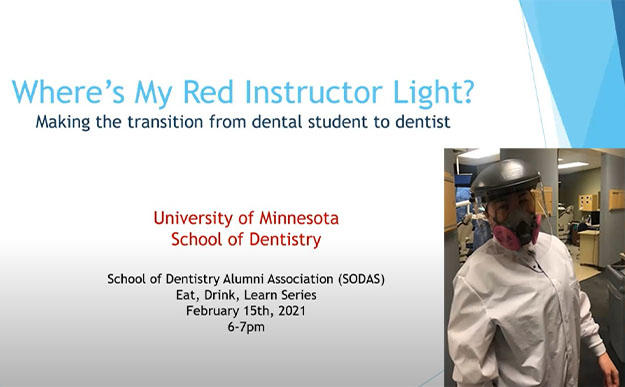Leaving the instructor light behind: Life after dental school

An oral health professional completes a procedure flawlessly. They’ve checked every box, completed every necessary step, and are proud of their work. Satisfied, they turn to switch on the red light that tells their instructor they’re ready for a check—and it’s not there.
No, it’s not a nightmare: it’s the plight many recent graduates find themselves in as they embark on their professional careers. And it’s not something that just plagues new graduates, either. “Even many years out of school, I sometimes wish I still had that light, so I could ask a question,” Shivan Nelson, DDS, who graduated in 2011, noted.
The transition from practicing in dental school to being on one’s own can be jarring for students.
To help ease that transition, the School of Dentistry Alumni Board invited students to attend a virtual “Eat, Drink, Learn” session—a virtual alternative to lunch and learn opportunities—hosted by Shivan Nelson, DDS. She shared her advice on becoming an oral health practitioner—from interviewing to settling into a career.
Nelson, who serves on the School of Dentistry Alumni Board, is the dental director for Community Dental Care, where she hires, trains, and mentors new dentists each year.
“I often hear the same questions from our new graduates, and find myself giving them similar advice and tips,” she explained. So the topic choice was a no-brainer: “I figured other students might want to hear that same information.”
Nelson titled her presentation “Where’s my red instructor light?” and shared advice on how to find a job, prepare for and succeed in an interview, build confidence as a new dentist, and be proactive and resourceful.
“The majority of my presentation to students focused on steps students can take now to help set them up for success in the future,” Nelson explained. She hoped this presentation could “encourage students to plan ahead and be thoughtful in their career choices, in the hopes that students can have the best jump start into the profession as possible.”
One of the most important things Nelson hopes attendees picked up from her presentation is the importance of planning ahead and understanding the variety of opportunities available to them. “I want students to be aware of as many of these opportunities as possible,” she said.
Nelson also hopes students can be forward-looking enough to find a position that fits their desires and needs, too. “I want our graduates to go out into the real world confident and prepared,” she said. That preparedness helps students make a good impression and reflect well on the School of Dentistry, and it helps them realize their desires, goals, and needs in a position.
The presentation was filled with practical advice for students and answers to questions they might not have yet known they had.
Abigaile Enrici, DDS ‘23, has a lot of those questions. “I wanted to attend this talk because the thought of being in the clinic soon treating patients rather than working with my typodont is a little intimidating. And it’s even more intimidating to think about being on my own as an actual dentist soon after that.”
She appreciated hearing Nelson’s take and advice. “Having Dr. Nelson explain some of the ins and outs of what to expect was not only comforting, but also motivating. I, too, can do all of this one day.”
At the end of the day, Nelson wants students to know that they can always reach out to her and other alumni for support. “The University provides a great foundation, but the learning really just begins as you leave school,” she explained.
“The practice of dentistry involves lifelong learning, and I and my colleagues want new graduates to have the resources they need when they need support and guidance. Most of us remember what it was like to be a new graduate, and alumni are ready and willing to help new graduates. I want new dentists, dental therapists, and dental hygienists not to hesitate to reach out to their networks, to former professors, and to their colleagues for mentorship. None of us would be where we are in our careers without the help of good mentors.”